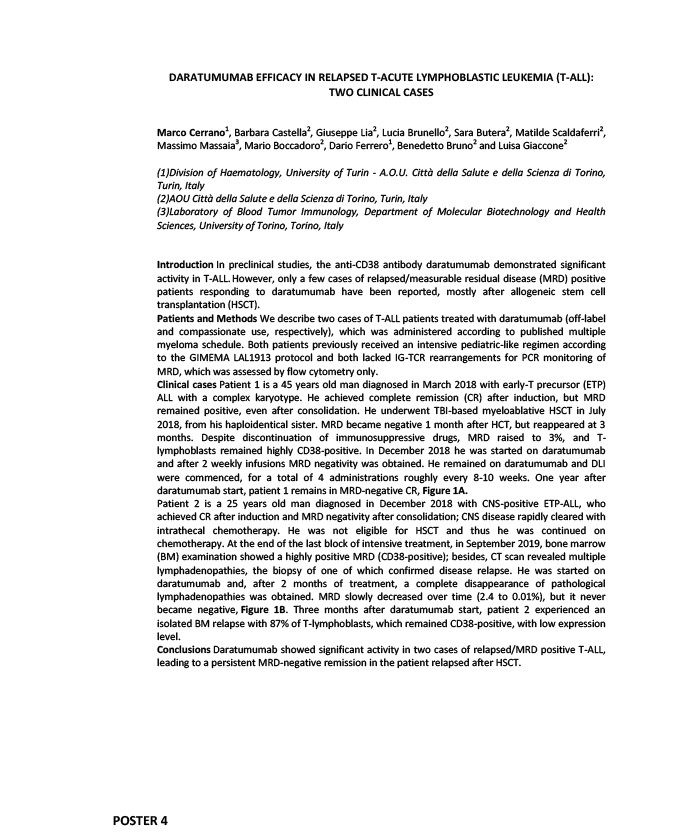
DARATUMUMAB EFFICACY IN RELAPSED T-ACUTE LYMPHOBLASTIC LEUKEMIA (T-ALL):
POSTER 4
TWO CLINICAL CASES
Marco Cerrano1, Barbara Castella2, Giuseppe Lia2, Lucia Brunello2, Sara Butera2, Matilde Scaldaferri2,
Massimo Massaia3, Mario Boccadoro2, Dario Ferrero1, Benedetto Bruno2 and Luisa Giaccone2
(1)Division of Haematology, University of Turin - A.O.U. Città della Salute e della Scienza di Torino,
Turin, Italy
(2)AOU Città della Salute e della Scienza di Torino, Turin, Italy
(3)Laboratory of Blood Tumor Immunology, Department of Molecular Biotechnology and Health
Sciences, University of Torino, Torino, Italy
Introduction In preclinical studies, the anti-CD38 antibody daratumumab demonstrated significant
activity in T-ALL. However, only a few cases of relapsed/measurable residual disease (MRD) positive
patients responding to daratumumab have been reported, mostly after allogeneic stem cell
transplantation (HSCT).
Patients and Methods We describe two cases of T-ALL patients treated with daratumumab (off-label
and compassionate use, respectively), which was administered according to published multiple
myeloma schedule. Both patients previously received an intensive pediatric-like regimen according
to the GIMEMA LAL1913 protocol and both lacked IG-TCR rearrangements for PCR monitoring of
MRD, which was assessed by flow cytometry only.
Clinical cases Patient 1 is a 45 years old man diagnosed in March 2018 with early-T precursor (ETP)
ALL with a complex karyotype. He achieved complete remission (CR) after induction, but MRD
remained positive, even after consolidation. He underwent TBI-based myeloablative HSCT in July
2018, from his haploidentical sister. MRD became negative 1 month after HCT, but reappeared at 3
months. Despite discontinuation of immunosuppressive drugs, MRD raised to 3%, and T-lymphoblasts
remained highly CD38-positive. In December 2018 he was started on daratumumab
and after 2 weekly infusions MRD negativity was obtained. He remained on daratumumab and DLI
were commenced, for a total of 4 administrations roughly every 8-10 weeks. One year after
daratumumab start, patient 1 remains in MRD-negative CR, Figure 1A.
Patient 2 is a 25 years old man diagnosed in December 2018 with CNS-positive ETP-ALL, who
achieved CR after induction and MRD negativity after consolidation; CNS disease rapidly cleared with
intrathecal chemotherapy. He was not eligible for HSCT and thus he was continued on
chemotherapy. At the end of the last block of intensive treatment, in September 2019, bone marrow
(BM) examination showed a highly positive MRD (CD38-positive); besides, CT scan revealed multiple
lymphadenopathies, the biopsy of one of which confirmed disease relapse. He was started on
daratumumab and, after 2 months of treatment, a complete disappearance of pathological
lymphadenopathies was obtained. MRD slowly decreased over time (2.4 to 0.01%), but it never
became negative, Figure 1B. Three months after daratumumab start, patient 2 experienced an
isolated BM relapse with 87% of T-lymphoblasts, which remained CD38-positive, with low expression
level.
Conclusions Daratumumab showed significant activity in two cases of relapsed/MRD positive T-ALL,
leading to a persistent MRD-negative remission in the patient relapsed after HSCT.